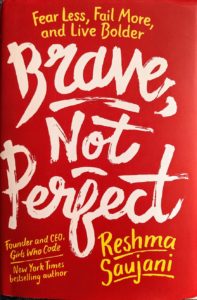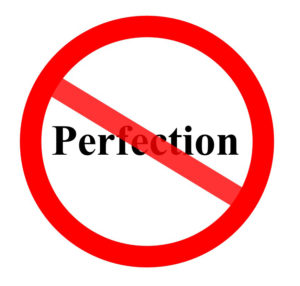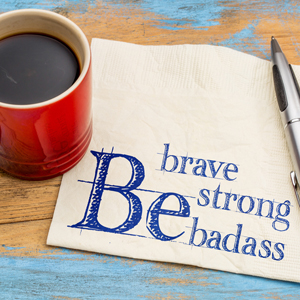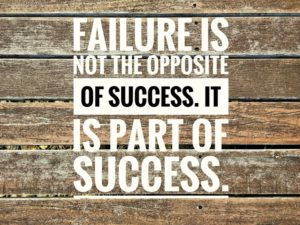Embrace Your Imperfection
 If posed with the question, “Which do you strive to be—brave or perfect,” I would guess that most people would answer “brave.” Perfection is not something to strive for. Achieving perfection is, after all, impossible … right?
If posed with the question, “Which do you strive to be—brave or perfect,” I would guess that most people would answer “brave.” Perfection is not something to strive for. Achieving perfection is, after all, impossible … right?
Right. Perfection is an impossible state. But that doesn’t mean we don’t strive to reach that state—even if we won’t readily admit it. And women, Reshma Saujani contends in her brave new book Brave Not Perfect, suffer from the destructive affliction of perfection-seeking more often than men. We’re raised to. By our parents, our teachers, our culture.
What? I thought women suffer from a greater lack of confidence and self-esteem? Forget about “perfection!” Don’t women just struggle to feel good enough?
Yes, they do! And. That is the point. When your goal is perfection, you will never “be good enough.” You will always fall short.
“Being a go-getter and being gutsy aren’t necessarily the same”
Wildly “successful” Saujani lists what see refers to as her pedigree: Yale Law School, a job at a top-five law firm, followed by a high-power position in the financial sector. “You probably would think I was a gutsy go-getter,” Saujani writes. “But being a go-getter and being gutsy aren’t necessarily the same.”
Saujani credits her acceptance to Yale to “the drive to cultivate the perfect resume,” her prestigious jobs to fulfilling her father’s dreams for her: “From the time I was a little girl, I had always set my sights on being the best, and every move I made was an effort to make me appear smart and competent … I made all these choices to build the ‘perfect me,’ because I believed that would lead to the perfect life.”
Have You Been Chasing “The Perfect Life?”
 So … I would venture to guess that most of us did not graduate from Yale Law School. But, while our own life details may be different than Saujani’s, does anything in her story feel the least bit familiar? Maybe a little too familiar?
So … I would venture to guess that most of us did not graduate from Yale Law School. But, while our own life details may be different than Saujani’s, does anything in her story feel the least bit familiar? Maybe a little too familiar?
How many of our goals—if we’re being totally honest—have we set with an underlying goal of appearing “smart and competent?” How many were based on others’ visions of what we “should” become?
And how many of us took the safe road, the path on which we knew we’d have success?
What’s Wrong with Success?
What’s wrong with smart and competent? What’s the problem with wanting success? Absolutely nothing—as long as we don’t limit our growth, compromise our dreams, sell ourselves short. While it might seem counter-intuitive, chasing the “perfect life” does all of the above.
Embracing Brave
Saujani claims that the very first time she did anything brave in her adult life was when she ran for U.S Congress in 2010. She ran against a well-positioned incumbent and against well-meaning advice. And while her race gained a great deal of media attention and several important endorsements, she lost—big time. (She received just 19% of the vote.)
Still, Saujani believes the decision to run for office was one of the best decisions of her life. After she got over the initial shock and shame (yes, that relentless monster shame raised its ugly head), Saujani never looked back. She has continued on her brave path ever since.
Why is it so hard for women to embrace “brave”? It’s the way we’ve been raised.
“Girls are Raised to Be Perfect. Boys are Raised to Be Brave”

 Our whole culture, according to Saujani, is set up to “protect” girls from failure: “To strive to get all A’s to please our parents and teachers. To be careful not to climb too high on the jungle gym so we don’t fall and get hurt. To sit quietly and obediently, to look pretty, to be agreeable so we will be well liked.”
Our whole culture, according to Saujani, is set up to “protect” girls from failure: “To strive to get all A’s to please our parents and teachers. To be careful not to climb too high on the jungle gym so we don’t fall and get hurt. To sit quietly and obediently, to look pretty, to be agreeable so we will be well liked.”
From the start, girls are groomed to play it safe. Unfortunately, the destructive underlying message is that they’ll fall apart in the face of adversity or setbacks, that they’re too delicate to fail.
Boys, on the other hand, are encouraged to take risks, to play rough and tumble, and if they get hurt, to get up, brush themselves off, and move on. Mistakes are not “failures” but invitations to try again—and again. Boys are raised to develop mastery through trial and error, through learning and growth.
In other words, girls are raised to be perfect; boys are raised to be brave.
If Girls Are Not Certain They Will Succeed, They Often Don’t Even Try
This “bravery deficit,” as Saujani calls it, in girls and women is not only harmful to us as individuals but to society as a whole.
Carol Dweck, famous for her work on mindsets, looked at differences between boys and girls in schools. When fifth graders were given an assignment that was too difficult for them, girls were much more likely than boys to throw in the towel. While girls routinely gave up, boys saw the assignment as a challenge and redoubled their efforts. This is true even though girls generally outperform boys in every school subject, including STEM.
If girls are not certain they will succeed, they often don’t even try.
Lack of Confidence is Not the Reason
This is true for women as well. Here’s a jarring statistic: According to a Hewlett Packard internal report, men have no trouble applying for jobs when they meet 60% of the qualifications. Women, however, will apply only if they meet all of them—100%! Many have assumed this difference is due to a lack of confidence in women, but Tara Mohr looked more closely and discovered other reasons.
In her article “Why Women Don’t Apply for Jobs Unless They’re 100% Qualified” published in the Harvard Business, Mohr discusses a survey she gave to over 1000 women and men. She asked them ““If you decided not to apply for a job because you didn’t meet all the qualifications, why didn’t you apply?” The least common response chosen by all participants (men and women) was “I didn’t think I could do the job well,” so a lack confidence was not the motivating factor. The most common reason for not applying, for both men and women, was “I didn’t think they would hire me since I didn’t meet the qualifications, and I didn’t want to waste my time and energy.” So far, this all makes sense.
But Mohr did find important gender differences that align with those in Saujani’s perfection/bravery model: 22% of women, compared to 13% of men, chose this as their top reason: “I didn’t think they would hire me since I didn’t meet the qualifications and I didn’t want to put myself out there if I was likely to fail.”
Being Brave—Like Women
 Fear of failure! If only women would Feel the Fear and Do It Anyway!
Fear of failure! If only women would Feel the Fear and Do It Anyway!
But how? How to shift gears—and mindsets—from perfection to bravery. The answer is not being more like men. It’s finding our own way: being “brave like women.”
“It’s time to play to our strengths instead of hiding them,” Saujani writes, “no matter how ‘masculine’ or ‘feminine’ we think they are.” Being brave is about being authentic, not about “following the rules written by men.”
Saujani is not suggesting that this will be easy: “There are real structural challenges against women,” she acknowledges. “… the reality is that it will still be a while before we see big changes in the gender equality landscape. That’s the bad news. The good news is that how we respond and act in the face of these obstacles is up to us.”
Women are used to an uphill climb, and, thankfully, we are very resourceful and creative. So … how can we respond to these challenges?
Saujani’s Brave Example
Saujani, for one, started Girls Who Code in 2012, an organization whose mission is to “reverse the trend” of girls losing interest in STEM subjects. Her goal is help close the gender gap in technology by teaching girls to code.
Girls Who Code has become a national movement, with over 185,000 girls participating in the program. Saujani realized, shortly after starting Girls Who Code, that she was not only teaching girls a critical technological skill but teaching them to be brave as well.
I am thrilled to see brave changes in the way we are educating our young girls. But what about those of us who have grown up with the perfection (brave-deficit) mindset? What are we to do?
Developing a Bravery Mindset
Saujani provides some wonderful strategies for developing a bravery mindset, many of which, I happy to say, we have spent some time talking about in this blog!
Here are just a few of Saujani’s suggestions:
-
“Keep Your Tank Full”
or make your health and rest a priority. Top of the list—and one that I am guilty of ignoring—is the need to get a good night’s sleep.
-
Harness the Power of the Three-Letter Word “Yet.”
Saujani credits Carol Dweck with this strategy that frees us from “the tyranny of now” and projects us into the possible.
Whenever you make a statement of lack about yourself, such as “I am not brave,” or “I am not the type of person who takes risks” or … “is able to say ‘no'” or … “takes her own needs seriously,” add the word “yet” to the end of the sentence.
So … “I don’t feel comfortable standing up for myself” becomes “I don’t feel comfortable standing up for myself yet.” Oh, the freedom that little word can bring!
-
“Take Your Own Advice”
When you’re in a bravery crisis, pretend that your friend has come to you for help. What would you tell her? Follow your own encouraging advice!
-
“Set Daily Bravery Challenges.”
This is one that I have incorporated into a daily practice. I make a daily “to do” list, and at least one thing on the list must include something that takes me out of my comfort zone. Whether it’s making a difficult phone call I’ve been putting off or just driving to see my students without putting the radio/podcast/music on—(it can be scary to be alone with your thoughts!)—I make sure that I do something that feels like a challenge.
By taking these small leaps regularly, the bigger braver tasks seem less daunting. I am much more likely to take the bigger risks after I’ve tackled the smaller ones.
“Failure” is Not the Opposite of Success
 One thing to remember here. When you practice taking risks and venturing onto different paths, you will encounter obstacles. You may even “fail.” But failure is not the opposite of success. Some of my biggest “failures” have been my greatest sources of learning and growth—and there is truly no greater measure of success than that.
One thing to remember here. When you practice taking risks and venturing onto different paths, you will encounter obstacles. You may even “fail.” But failure is not the opposite of success. Some of my biggest “failures” have been my greatest sources of learning and growth—and there is truly no greater measure of success than that.
When was the last time you embraced your imperfection? When has “failure” been your greatest teacher? And what can/do you do to invite the bravery mindset into your life?
As always, I’d love to hear your thoughts! Please write a comment or send me an email!
Wishing you all a wonderful, brave, imperfect week!
See you next Friday!
Diane



Diane! You are the best. I miss you so much. I loved this article!!! Xoxo
Thanks, Theresa! Miss you too! Hope all is well and so glad to have you aboard!!
Oh, wow, Diane. I needed this, as all writers do. ‘Yet’ is so freeing, and ‘failure is not the opposite of success’ helps a lot.
If pushed to be truthful, many women would say that they want to be perfect—because they have been programmed to fear risk.
Great article. I’m bookmarking this.
Thank you, Greta! I also LOVE the “yet!” It is freeing–time to reprogram!!